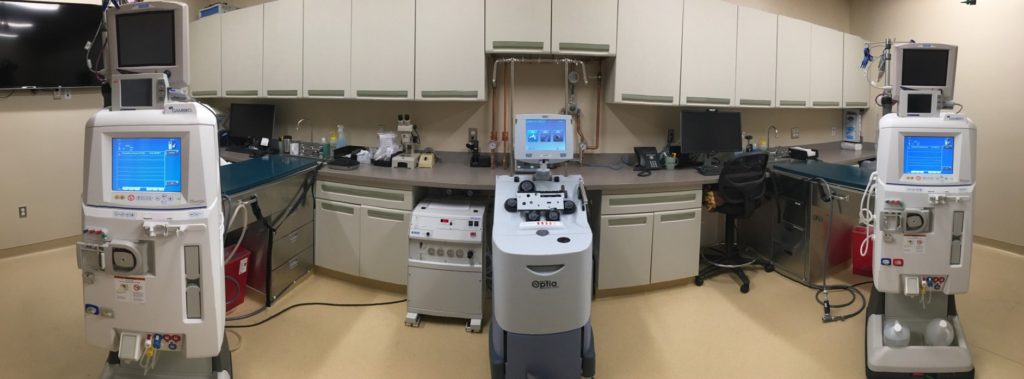Hemodialysis at Friendship Hospital for Animals
Friendship Hospital for Animals offers a range of extracorporeal services including hemodialysis, hemoperfusion, and ultrafiltration. The most common indication for hemodialysis in our patients is acute kidney injury. Patients refractory to medical therapy, as well as, oligoanuric patients are candidates for hemodialysis. Hypervolemia, acidemia, and electrolyte disturbances, such as hyperkalemia, can be quickly and effectively managed with hemodialysis. Chronic kidney disease can also be managed with ongoing hemodialysis.

The duration of dialysis therapy is quite variable. Many toxicities (such as ethylene glycol, NSAID ingestion, etc) can be treated with a single treatment. Oligoanuric patients with acute kidney injury may require as few as 1-3 treatments until they become polyuric, thus often allowing the reintroduction of traditional management. However, patients with severe kidney injury may require weeks to months to regain kidney function. Dialysis is initially performed on an inpatient basis; however, patients are transition to outpatient dialysis when stable.
The survival for acute kidney injury patients treated with hemodialysis is overall approximately 50%; however, there is a wide variability in mortality. Infectious etiologies (leptospirosis, pyelonephritis) have upwards of 90% survival, whereas toxicity (azotemic ethylene glycol, or lily) is closer to 15-50%. While 50% overall survival may sound poor, remember that nearly 100% of these patients have already failed medical therapy!
What Can Be Treated:
- Ethylene Glycol Ingestion
- Refractory Congestive Heart Failure
- Leptospirosis (dogs)
- Ureteral Obstruction
- Lily Toxicity
- Pyelonephritis
- Volume Overload
- AKI secondary to systemic disease
- Acute uremia of unknown cause
- Refractory Hyperkalemia and Acidosis
- Acute Poisonings (some may be treated with hemoperfusion)
- NSAID ingestion
- Chemotherapy and many other Medication Accidental Overdose
- Chronic Renal Failure/Chronic Kidney Disease
- Transplant Stabilization (Pre- or Post-Transplant)
- Many Other Toxins and Medications
A Note on Toxicities:
Poison Control Centers often do not realize dialysis can help in the treatment of a toxicity. Dialysis treatment prior to organ dysfunction gives patients the best possible outcome. Call to discuss if dialysis can help!
Refer Early!
Consultation calls are encouraged early in evaluation and management of a patient. Delays in the onset of hemodialysis can negatively impact the outcome.
Client Education:
A member of the hemodialysis team would ideally like to speak directly to clients prior to referral. This ensures full understanding of the costs, potential complications of hemodialysis, likely prognosis, clinical plan, and client commitment throughout treatment.
Spare the Jugular Vein!
Hemodialysis requires the placement of a specialized catheter in a non-traumatized jugular vein. Avoid jugular venipuncture and jugular catheter placement if at all possible.
More from Dr. Foster:
American Veterinarian interview “Which Veterinary Patients Need Dialysis?”
American Veterinarian interview “The Biggest Hurdle for Veterinarians Performing Dialysis”
Please inquire to learn more about the extracorporeal services currently being offered at Friendship Hospital for Animals. We will gladly consult on any cases that you feel will potentially benefit from blood purification. To contact our dialysis department, please call 202.567.2083 or email our department directly at nephrology@friendshiphospital.com.
